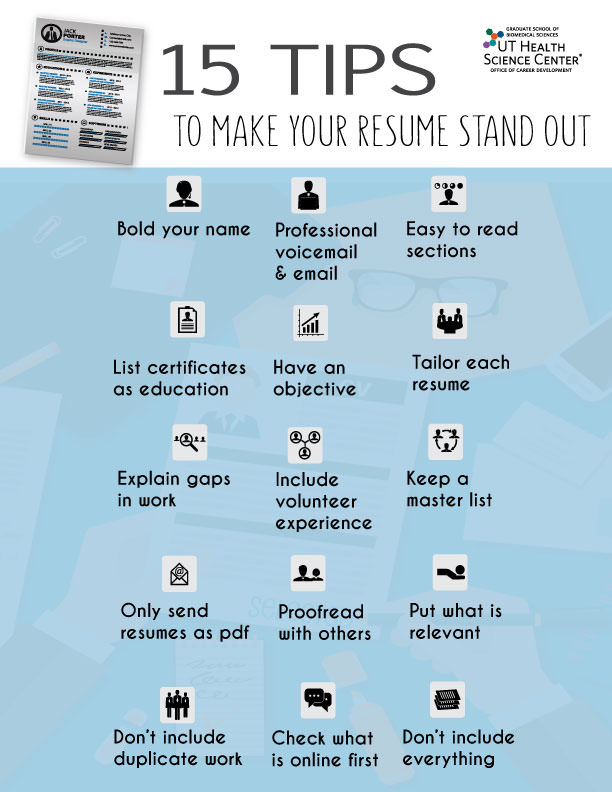The Career Series: Top 15 Tips To Help Your Resume Stand Out
Need help with your resume or C.V.? Here are 15 helpful tips to help you communicate your career on paper.
Also, here is a C.V. template and resume template to help you get started. For examples, see James Rhodes, Mary Applebee, and April Bluebird.
To see the full presentation, click here.
1. Your name should stand out
Use bold to emphasize only the most important features of your resume.
2. Have professional contact information
Be sure you have a professional-sounding voice message and a professional email address. You would be surprised how many people don’t follow this advice.
3. Make sure the section headers are clear and easy to read
Common resume sections include personal info, objective summary education, work experience, special skills, memberships/honors/awards, volunteer experience.
4. List certifications as education not under awards
Certifications show ongoing commitment to learning. Be sure not to just take online classes.
5. Have an objective
Be sure to have an objective like “seeking position as an elementary school teacher.” This allows a recruiter to quickly scan your resume and also match you to other relevant positions.
6. Tailor each resume to the job you are seeking
Resumes should be tailored to the job outlined in the job description. Pay attention to the soft skills. If the job description mentions “commitment to integrity” and “collaborative work experience” be able to point it out in your resume. This could be shown by attending the Spotlight on Research Integrity workshop or by having examples of projects that you did as a team. The hard skills get you in the door but the soft skills get you the job.
7. Include explanations for gaps in work experience
It’s ok to say “family leave” with the dates specified.
8. Include volunteer experience
If you are new in your career and lack work experience, be sure to include membership in community and campus organizations along with volunteer experience. Often this can be the first question an interviewer will ask because it shows what you are interested in.
9. Keep a master list
Keep a master list of every activity you’ve ever done because you never know if something is relevant. This also allows you to go through what’s relevant for different jobs quickly.
10. Only send resumes in pdf
You don’t want people to edit your resume. Also it’s much easier for a recruiter to save a pdf than to open Microsoft Word file.
11. Proofread
Send your resume to someone else for proofreading. You rarely find your own typos.
12. Put what is relevant
If they ask for a CV, give them a CV. If they ask for
publications, be sure to have it in there. If not, don’t put extra sections.
Also don’t put basic skills which everyone might have like pipetting or western
blots, be sure to list specific skills that show that you would excel at the
job. Also, do not include references unless asked. It is preferred to leave them off so that you can prepare your referees in advance.
13. Check what’s online
Google yourself and find what comes up. Also be sure to
PubMed yourself because research that you participated in while and
undergraduate and graduate student may have become a published article.
14. Abstracts are ok but publications are better
It’s ok to include an abstract but if you’ve presented your abstract at three places, pick one. If you’ve published it than use that instead.
15. You don’t have to include everything in a resume
While it’s important to keep a master list, you don’t want to turn in your master list to an employer. Part of job hunting is picking what’s relevant and taking off what’s not relevant, this makes it easy for the recruiter to see that you have the skills and experience needed for this job. For a CV you keep almost everything, but can remove some redundancy.

